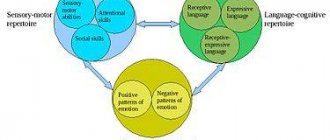Today we have to figure out how to enter a psychology college after 9th grade or after 11th grade. The main attention will be paid to the first option. The fact is that schooling is a mandatory process. But you can finish it after 9 years of schooling. Then you will have to think about your future profession. And either study the remaining time at school, and then choose a university, and then enroll for higher education, or give preference to colleges. The second option is increasingly attracting schoolchildren. How can you become a psychologist? Where and how long to study for it? What challenges will you face? What do students and teachers think about studying to become a psychologist after 9th grade? All this will be discussed further below.
COLLEGE OF PSYCHOLOGY AND PEDAGOGY IN MOSCOW
College of Psychology and Pedagogy - quality education in the field of psychology and pedagogy
Enter the College of Pedagogy and Psychology after 9th or 11th grade, transferring from another college.
The main questions that applicants and their parents have when choosing an educational institution.
Why is it better to go to college after 9th grade?
1. Opportunity to obtain a specialized specialty and education in 3 years.
2. Admission to the institute for a shortened training program.
3. Possibility to combine work and study.
4. Deferment from the army.
Where to go to study after 9th grade in Moscow?
First of all, when choosing a college or technical school for admission, you need to make sure that you have a valid license to conduct educational activities. Next, familiarize yourself with the accreditation of the educational institution and its annex. These legal documents are a guarantee of receiving a quality education.
Where and how to get an education in psychology and pedagogy?
02/44/04 SPECIAL PRESCHOOL EDUCATION
Graduate qualification: “teacher of preschool children with developmental disabilities and with intact development.”
Qualification characteristics of the graduate. The graduate prepares to work as a teacher of preschool children with developmental disabilities and with intact development in special (correctional) educational institutions of various types. The following types of activities: Organization of events aimed at strengthening the child’s health and physical development. Training and organization of various types of activities and communication of children with preserved development. Training and organization of various types of activities and communication for children with disabilities. Interaction with parents, their substitutes and employees of the educational institution. Methodological support of the educational process.
What form of study should I choose for admission?
The choice of form of study depends on the desires and capabilities of each individual applicant.
For admission to the College of Psychology and Pedagogy, we offer the following forms of training
Full-time education (for applicants based on grades 9 or 11, transfer from another institution)
evening training (for applicants based on grades 9 or 11, transfer from another institution) of any age
weekend group (for applicants in grades 9 or 11, transfer from another institution) of any age
distance learning (for applicants based on grades 9 or 11, transfer from another institution) of any age
distance learning (for applicants based on grades 9 or 11, transfer from another institution) of any age.
An interview with an applicant is a mandatory stage of admission to MKIK College
The International College of Arts and Communications is a space of mutual respect, professional development and self-realization. The mission of MKIK is responsible education: we are responsible to parents and students for creating a high-quality educational environment and a creative atmosphere.
In turn, the responsibility for learning lies with the student. Therefore, when entering college, future students undergo an interview aimed at understanding how comfortable the student will be studying in our educational conditions. The interview takes place in the form of a business game.
Admission based on 9th grade
If you are looking for inexpensive colleges in Moscow and the Moscow region that accept students after the 9th grade of high school, we invite you to our economic business college in the South-Eastern Administrative District.
- Admission based on interview
- Nonresidents are provided with a hostel
- Individual payment terms are possible
Graduates with certificates of basic general education can choose an interesting specialty, go to college and receive additional specialized professional education.
List of universities for studying psychology
Moscow State University named after. M.V. Lomonosov: there are unique areas of modern psychology “Computer Psychology”, “Psychological Safety” and an exclusive course on cognitive psychology by Boris Mitrofanovich Velichkovsky, the author of the 3-volume work “Cognitive Psychology”.
Research University "Higher School of Economics": training based on the interdisciplinary intersection of psychology with neuroscience, economics, mathematics and sociology. Knowledge of foreign languages is required, which allows you to travel to other countries on student exchange programs in Germany, the UK, and France. There are excellent world-class research laboratories. Students study according to a modular system. This allows you to choose courses, independently build a training route and, if desired, simultaneously acquire additional education profiles from those areas that the university has. The tower's strong point is specialization in cognitive psychology and neuroscience, counseling psychology, social and organizational psychology.
State Academic University of Humanities under the Russian Academy of Sciences: an educational institution at the Institute of Psychology of the Russian Academy of Sciences. If you want to meet a real academician every day, you need to go study here. This is a relatively young university, no more than 30 years old. All scientific laboratories that exist at the IP RAS have their own educational niche in the university. There are very few students in the groups, so everyone has an exceptional opportunity to receive their share of attention from major Russian scientists. Students study all disciplines that are “assigned” to the fundamental areas of classical psychology - experimental psychology, psychophysiology, psychodiagnostics, occupational psychology, engineering psychology, personality psychology, analytical psychology. Since IP RAS cooperates with the largest laboratories in the world and famous scientists, exclusive meetings, guest lectures and master classes are not uncommon at the university. The Institute of Psychology is open to everyone who wants to be closer to fundamental science.
Moscow colleges
College of Information Technology IT HUB
Specialties of the future. Internships in large IT companies. Admission without OGE/USE. State diploma. In-person and online training.
MAP under the Moscow Government
Without exams and Unified State Examination based on grades 9 and 11. State diploma, 9 directions, all forms of training. College-university program.
University College
State diploma. Based on 9th and 11th grades. All forms of training. No exams or Unified State Examination.
Basic education
The profession of psychologist, which is relatively new to our country, is becoming increasingly popular today. And, as a result, the market for psychological education is expanding.
The first psychology department was opened in 1966 at Moscow State University and is still considered the leading department in Russia. According to his standards, training is conducted at all psychological faculties in the country.
Also, the following can boast of a good basic psychological education:
- High School of Economics;
- Russian State Humanitarian University;
- Moscow Pedagogical State University and many other universities in the country.
Psychologist
A psychologist specializes in the patterns, forms and manifestations of mental phenomena and personality states, and in the peculiarities of human mental development. He can both engage in research activities and apply his knowledge in practice (to provide advisory assistance, to work with personnel at enterprises and institutions). This is a helping profession from the “person-to-person” category. The profession is suitable for those who are interested in biology and psychology (see choosing a profession based on interest in school subjects).
Main responsibilities
There are advantages and disadvantages to this work. The main disadvantages are the constant tension and stress that inevitably arise when communicating with patients. You should not forget about them if you want to become a practicing psychologist. The specialist's activities include:
- various tests carried out to determine the personal characteristics of clients;
- psychological trainings;
- consultations in difficult life situations;
- analysis of the influence of social, professional and other factors on behavior and thinking;
- studying the reasons resulting from the unsatisfactory condition of patients;
- therapeutic conversations, individual counseling;
- assistance in adaptation (at a new place of residence, in a different team).
Short description
The quality of life of every person is affected not only by his physical health, but also by his psychological health. In recent decades, this truth has become increasingly firmly established in the minds of people, and psychologists have proven to be an effective tool for solving many internal problems that a person is not able to cope with on his own. They often work together with doctors, or use their knowledge to maintain a comfortable psychological climate in organizations. Work in the field of psychology also requires a sufficient level of awareness, the absence of serious internal contradictions on the part of the psychologist himself, therefore it is almost always preceded or accompanied by a visit by a specialist to his own psychotherapist.
Features of the profession: who is a psychologist?
Psychologists always work with people. They are required to unconditionally adhere to professional ethics and adherence to the well-known principle of “do no harm.” The psychological problems their clients face are almost always complex and deeply rooted in their past. Understanding them can be difficult even for experienced specialists, so the profession requires regular additional education and advanced training. The main job responsibilities of a psychologist can be reduced to the following:
- Analysis of the psychological state and psychological processes, personal characteristics, level of psychological development of a person (or the psychological climate in the team).
- Providing psychological assistance to people to resolve intrapersonal problems (or to teams to resolve interpersonal conflicts).
- Conducting psychological diagnostics, processing the results, drawing up psychological portraits of the individual.
- Corrective work aimed at eliminating deviations from normal psychological development (most often carried out with children).
- Carrying out preventive work aimed at preventing deviations in psychological development.
- Conducting career guidance activities.
- Providing services to commercial and government firms (maintaining a favorable psychological climate among workers, recruiting personnel, resolving conflicts, working with dysfunctional families, and so on).
- Providing assistance to doctors and social services in working with certain categories of the population (people with addictions, victims of domestic violence, terminally ill patients, etc.).
- Conducting psychological research and experiments aimed at developing new knowledge in the field of psychology.
Psychologists (even those who are engaged in science and not directly helping people) inevitably require a high level of empathy, as well as the ability to distance themselves from the client’s problems and not allow them to seriously influence their own psychological state. This must partly be inherent in the person himself, and partly achieved during study and personal psychotherapy.
Teachers and speakers
Tatyana Dyment certified Iyengar yoga instructor, psychologist
Sergey Pastushenko Associate Professor, psychologist, specialist in the field of neurolinguistic programming
Maria Borisova Candidate of Psychological Sciences, educational psychologist, specialist in the field of schema therapy
Marina Spirande is a professional coach, specialist in the field of emotional intelligence, author of the book “Mindsurfing”
Kristina Shestakova psychologist, blogger, specialist in the field of trauma therapy and body-oriented therapy
Vladimir Tsarev, psychologist of the Moscow Service for Psychological Assistance to the Population, specialist in the field of emotionally focused therapy
see everyone
Pros and cons of being a psychologist
pros
- Socially significant profession.
- The opportunity to help people.
- Interesting work with little routine.
- Decent wages.
Minuses
- Insufficient university education for successful practice.
- The need to constantly educate yourself and go to your own therapy (or at least supervision).
- Low income at the beginning of a career or when working in state-owned enterprises.
- An emotionally taxing profession.
Important personal qualities
As already noted, excellent empathy abilities are the most important quality for a psychologist. But this does not mean that he immerses himself in empathy for each client and gives him advice. The task of a psychologist is to help a person find answers to his questions himself, and not to impose his own point of view. Therefore, emotional stability, impartiality, the ability to think without value judgments, observation, tact, and responsibility are also extremely important for him. Without these qualities, it will be too difficult to occupy a position as a psychologist and fulfill your duties with dignity.
Is the university's base sufficient or is additional education needed?
Psychology develops differently than other sciences. The goal of psychology is not final knowledge; what is more important for it is to find the meaning of one’s own life and help another person in this. Psychology is a lifelong learner. And this is an axiom of the profession. It is important to note that money is not a source of motivation for a psychologist. First you need to fall in love with your business. For example, if a person is going to become an international grandmaster in order to receive millions in prizes, then he will never become one. So it is with psychology. In a psychologist’s hierarchy of values, money cannot be in first place. A psychologist has a higher mission - to help people and society.
Half a century ago, it was assumed that thanks to the development of psychology, people would gain perfect knowledge about a person, his behavior, and personality traits. Fortunately or unfortunately, these forecasts and hopes did not come true. Post-Freudian psychoanalysis generally turned out to be a great mythology. Hopes for psychotherapy were also not justified; its results are very modest, because psychotherapy is more an art than a science, since the main factor of success in it is the personality of the therapist, and not a psychological theory.
A certified psychologist must choose the area of study himself. Study literature in detail and a lot, read foreign and domestic scientific journals. It is imperative to work practically. Then additional education will help develop abilities and become competitive. David Matsumoto, author of the textbook Psychology and Culture, which the whole world uses to study, advises taking as much knowledge as possible about scientific methodology, about scientific research, and combining it with mathematical methods and psychometrics. The Bible says, “Choose some work for yourself, and no sickness will befall you.” Work is the best means to elevate and improve a person, and psychology, like no other, satisfies this basic value to the greatest extent.
Where to study to become a psychologist?
Training to become a psychologist involves obtaining a higher education (specialty “Psychology”, code 37.03.01). To enroll, you must pass the Unified State Exam in Russian, biology and mathematics, or a foreign language at the discretion of the university. Some educational institutions also conduct interviews with all applicants as part of the admissions campaign (you can find out about this on the official website of the university, where one of the main profiles is supposed to be a psychologist).
Full-time education lasts 4 years, all other courses last 5 years. After completing your studies, you can enroll in a master's program (this option is more suitable for those who plan to study scientific psychology).
Courses
Conducts professional retraining courses “Practical Psychology”. Disciplines: introduction to the profession, introduction to psychology, the subject of experimental and practical psychology, theory of activity, mental processes, modern theories of personality, fundamentals of psychological health, psychology of advertising. The classes include demonstrations of psychotherapeutic work with a client. Monthly payment in installments. Groups up to 12 people. 2 forms of training (evening, daytime).
How to write applicant applications
Source: gomel.news
To enroll in a secondary vocational educational institution, the applicant is required to fill out an application. Depending on the status of the institution, the application form is slightly different.
To study at the college, you must enter the following information on the form:
- Full name, passport details, date of birth, telephone number and registration address.
- The chosen specialty and form of training (budget or contract).
- Information about secondary education: name of school/gymnasium, year of graduation, average score. Certificate number and series, personal achievements (medal).
- Clarifying data: foreign language proficiency and whether the applicant has previously received education at a college.
- Next to the required column, make a note about the need for a hostel.
- Signature of the applicant, date of writing the application.
- Confirm that you have read the college's regulatory documents.
- The obligation to provide original documents upon receipt is certified by signature.










